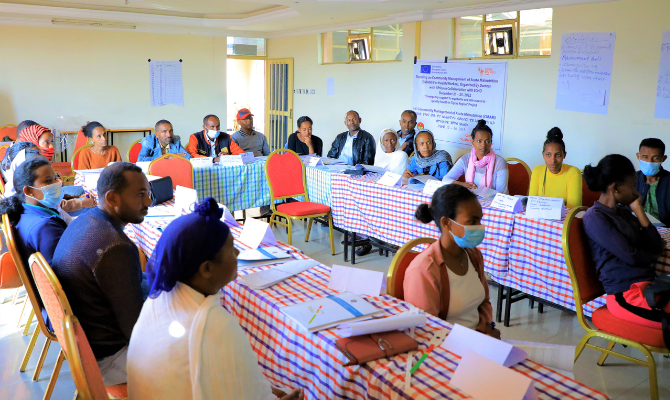As the internal conflict in the northern region of Tigary ceased with the peace agreement signed in November 2022, the IDPs crisis in Ethiopia remains dire. To date, 4.5 million people have been forced to flee their home due to conflicts, climate-related disasters and economic pressures in search of safety or simply opportunity.The majority of them is recorded in Tigray, Somali and Oromia regions where Doctors with Africa CUAMM is working with the twofold objective of responding to crises and finding sustainable and durable solutions to create a resilient health system.
Tigray region is hosting the highest number of IDPs displaced by conflict nationwide. As of May 2024, an estimated 871,056 individuals or 38.3% of the national conflict caseload were reported in the region. The war significantly disrupted Tigray’s healthcare system severely limiting people’s access to care. In the aftermath of the conflict, about 70% of hospitals and health centres in the region were either partially or fully damaged. Suhul Hospital, in Shire town, was one of them.
«I started working in this hospital before the war and I have experienced firsthand the consequences of the conflict in terms of human resources, medical equipment, and the satisfaction of both patients and health workers». said Gebremedhin Atakilti – Medical Director at Suhul Hospital.
To respond to the urgent needs of the local population, CUAMM stepped into the region with a first intervention aimed at rehabilitating Suhul Hospital, in Shire town, which serves as referral facility for over 2 million people, including IDPs.
Being one of the biggest urban centres in Tigray, Shire hosts some 175,000 IDPs of which 110,000 within host communities and many in the 6 IDPs camps disseminated across the town.
«Being located beside the camp, we often face cholera outbreaks and have to be ready to respond – said Tsegay Gebre Yesus – Chief of Five Angels Health Centre in Shire. At this little health centre we mainly serve IDPs offering them free care».
The conflict has severely hindered people’s access to healthcare services, affecting mainly women and children. CUAMM is working both at hospital level and within the community to restore key services such as maternal and neonatal care, malnutrition treatment and follow-up, HIV testing and antiretroviral therapy (ART). In addition, support is being provided to women and adolescent girls who have gone through violence.
While the conflict is the leading cause of displacement in the northern region of Tigray, the onset of El Niño has caused climate-induced displacement in the Southern and Southeastern parts of the country. As of May 2024, drought was the primary cause of displacement for an estimated 544,002 IDPs (16.5% of the national IDP caseload), across Somali, Oromia and Afar regions. Other climate induced reasons include flash floods, seasonal floods, landslides and fire. Such events have a severe impact on local populations in terms of food insecurity and risk of watern-born diseases.
Tigray region hosts the highest number of IDPs primarily due to conflict, whereas the Somali region in the east hosts the highest number of climate migrants, an estimated 397,913 individuals or 73.1% of the national drought caseload. Doctors with Africa CUAMM intervention in the area is targeting Fafan and Liben Zone where the weather conditions have limited people’s access to services and deepened their vulnerabilities. In order to facilitate access to care, CUAMM is deploying 2 Mobile Health and Nutrition teams in 11 selected villages across Filtu and Bokolmayo districts where 21,584 individuals have been reached to date. Health services provided include: paediatric immunization, antenatal care to pregnant women, malnutrition and psychological screening, anthelmintic treatment for schistosomiasis and emergency referral.
Conflicts, violence, prolonged drought combined with disease outbreaks, such as cholera, malaria, and measles, is further exacerbating the vulnerability of affected communities in Ethiopia, including IDPs and returning IDPs.





